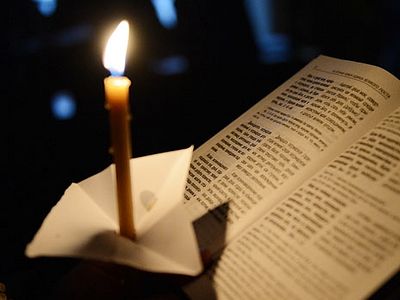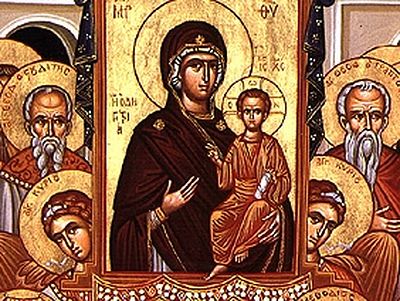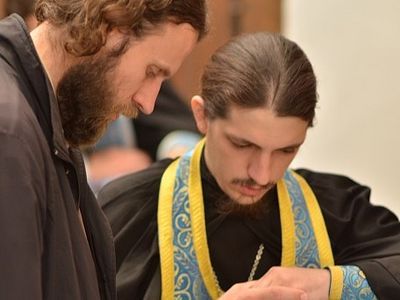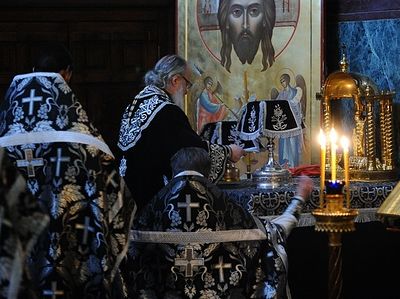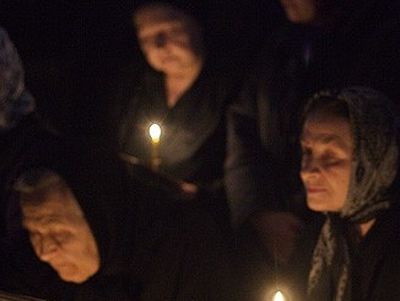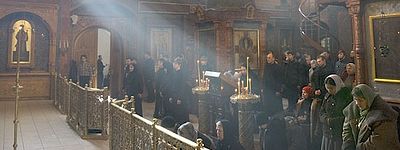Fasting sends our prayer to heaven, giving it as if wings.
—St. Basil the Great
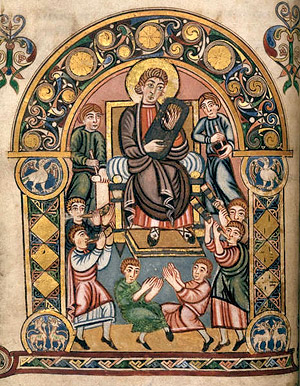 King and Prophet David the Psalmist.Miniature, British Library.
King and Prophet David the Psalmist.Miniature, British Library.
There are “podvizhniki” (ascetic laborers) who place a strict fast upon themselves, but they are also burning in their passions—anger, or hatred of neighbor. Such a fast is not pleasing to God. During the fast, we should be abstinent in everything: food, actions, words, desires... What is abstinence in desires? Well, for example a person loves meat, but for the Lord’s sake he does not eat it at all, just like the monks. Another decides not to watch television... These are all podvigs—ascetic labors. In the struggle with the passions a person cultivates patience, strength of will, and most important—humility.
For the Lord’s sake you can do any ascetic feat—quit smoking or drinking, or stop getting irritated; and the Lord will give you grace for these podvigs, fill your soul with joy and peace, and reveal the meaning of life. Some consider that we can do such podvigs ourselves, without the Lord. But this is pride speaking in us, while life shows us differently. There are many instances when a person could not quit drinking, smoking, or swearing, no matter how he tried. He may have trusted in his own will, and his friends and family may have helped him, or he may even have gone to doctors... But all in vain. Only when a person turns for help to the Lord, to the Mother of God, repents, asks for help, and promises to change does the Lord give him strength for the struggle, and his life is transformed.
The soul and body are healed by fasting. Fasting is a state of vigilance, a struggle with evil spirits and passions. If the demons of despondency, despair, boredom, anger, or jealousy creep in, turn in prayer to the Lord, ask His help for strength in the struggle, and prepare your flesh for the battle by fasting: the warrior who is weighed down will not overcome the enemy. The Church calls us to restraint; the Lord calls us to restraint.
From the book, During the Fast
Hymns from the Triodion in the first week of Great Lent. Tuesday
Let us observe a fast acceptable and pleasing to the Lord. True fasting is to put away all evil, to control the tongue, to forbear from anger, to abstain from lust, slander, falsehood and perjury. If we renounce these things, then is our fasting true and acceptable to God (Aposticha, Vespers for Tuesday).
Most blessed is the grace of the holy Fast. For through fasting Moses was glorified, and he received the Law written upon tablets; and through fasting the three Children were made stronger the the fire. Through fasting, then let us quench the burning passions of the flesh, and let us cry to Christ the Savior: Grant conversion to us all and deliver us from Gehenna (sessional hymn, Matins).
Be sober, be vigilant, groan and weep, my soul. Through fasting cast aside the whole burden of sin. By fervent repentance escape from the fire; through thy mourning, tear in pieces the mourning-garment of the passions and put on the robe of God.
Through fasting let us all ascend the mountain of virtuous action, forsaking the sensual temptations that creep upon the ground. Let us enter into the darkness of holy visions; by the divine and mystical ascent let us become godlike, and let us look only upon Christ our beloved in His beauty.
Giving wings to our soul through abstinence, let us all offer acceptable prayers to the Lord in heaven.
From the Lenten Triodion, translated from the original Greek by Mother Mary and Archimandrite Kallistos Ware, St. Tikhon’s Seminary Press, 1999.
On Fasting
Fasting turns back temptation, it adorns the ascetic laborer in piety, and sobriety and chastity accompany him.
—St. Basil the Great
Poor Lent! How much chiding, insult, and persecution it endures! But you see, it still stands, by the grace of God. And how else could it be? It has strong support! The Lord fasted, the Apostles fasted, and quite a lot at that, as the Apostle Paul said of himself, in fastings often (2 Cor. 11:27). And all the saints kept strict fasts, so that if we had an opportunity to look over the habitations of paradise we would not find there a single inhabitant who was alien to fasting. That is how it should be. Paradise was lost by violating the fast, and taking up strict fasting should number among the means by which we return to lost paradise. Our mother the Church is compassionate of heart; she is not our stepmother. Would she place upon us something that heavy and unnecessary? But she has placed it upon us! Truly it could not be any other way. Let us submit to it... Yes, and everyone who wants to be saved submits to it... Whoever tries to talk you out of fasting surely does not value salvation.
—St. Theophan the Recluse

